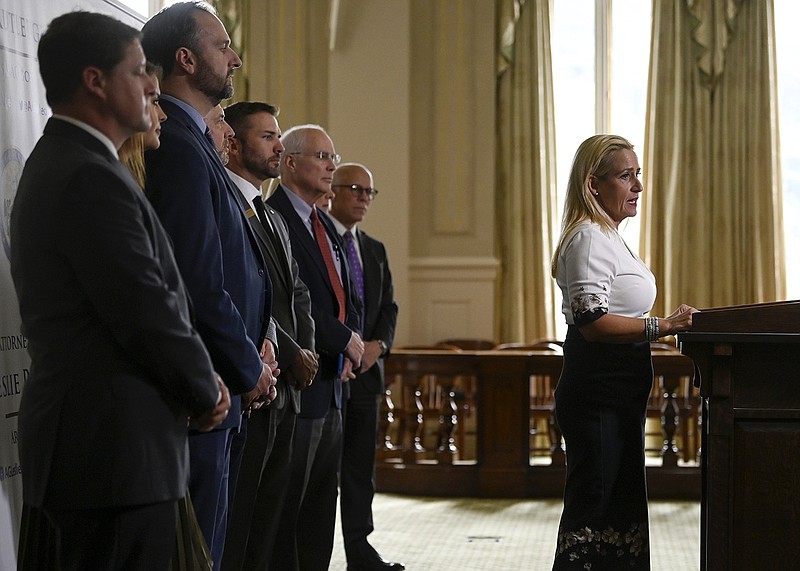The Arkansas Adult Drug Court program will get additional financial support from the state attorney general's office as officials hope to have a program in every jurisdiction.
Arkansas Attorney General Leslie Rutledge announced Tuesday a $1 million allocation to the program that will be used to support current programs and help create new ones.
"With this additional money I hope the Administrative Office of the Courts can continue to successfully rehabilitate Arkansas and restore hope in those lives that have been impacted by drug addiction," Rutledge said during a news conference where she was flanked by multiple members of the state's judiciary. "We need drug court programs in all 28 circuit court jurisdictions across Arkansas. I am hoping that today we can help make that happen."
Rutledge said the funding will come from the $573 million multi-state settlement with McKinsey & Company, the firm that promoted marketing schemes and consulting services to manufacturers like OxyContin maker Purdue Pharma. Arkansas was awarded $5.4 million in 2021 as part of the settlement.
"As we are talking about the influx of drugs in our state and the overcrowding in our prison population, it's through these alternative sentencing courts and these drug courts specifically that we can lower the recidivism rate and get people the help they need and stop the overcrowding in our prisons by making sure those with addictions receive the treatment and that we have judges across the state helping those addicts turn their lives around and stay out of the criminal justice system," Rutledge said.
Janet Hawley, speciality courts coordinator for the Administrative Office of the Courts, said 49 counties have established adult drug courts. Hawley said average cost to establish a drug court is $250,000, and approximately 2,800 people go through the program each year.
Independence County District Judge Chaney Taylor said the programs are designed to change criminal behavior that jail alone cannot.
"Moreover these programs are proven budget solutions to jail and prison overcrowding funding problems," he said. "When done correctly, these programs change lives for the better, make our communities more productive and more importantly safer."
Rutledge said the General Assembly and the judiciary recognize the impact speciality court programs have on making communities safer.
"Speciality courts provide individualized intervention for program participants, resulting in improved public safety, reducing recidivism and restoring the lives of the participants," she said.
Adult drug courts utilize a variety of tools for accountability, which include frequent court appearances and random drug testing.
"Every single one of us knows somebody who is battling addiction and who needs a helping hand from the court, or boundaries and encouragement from the court," Rutledge said. "They also need the treatment programs, and treatment programs are sadly not affordable for many across our state."
Arkansas' first drug court was established in in 1994. The 14- to 18-month program includes evidence-based treatment and strict supervision of participants by a judge, prosecuting attorney, defense attorney, treatment provider and law enforcement liaison to aid participants in their recovery.
In order to be eligible, the individual must not have a previous conviction or a pending charge of a serious felony offense involving violence, must not have a previous conviction or pending charge requiring registration as a sex offender, must have a moderate or severe substance use disorder and must be identified as high-risk, high-need.
Marty Sullivan, director of the Administrative Office of the Courts, said the funding provided by the attorney general's office will directly impact Arkansans.
"These programs provide evidence-based treatment services to individuals while supporting collaborative partnerships among the judiciary, public agencies, and community-based organizations," Sullivan said in a news release.
